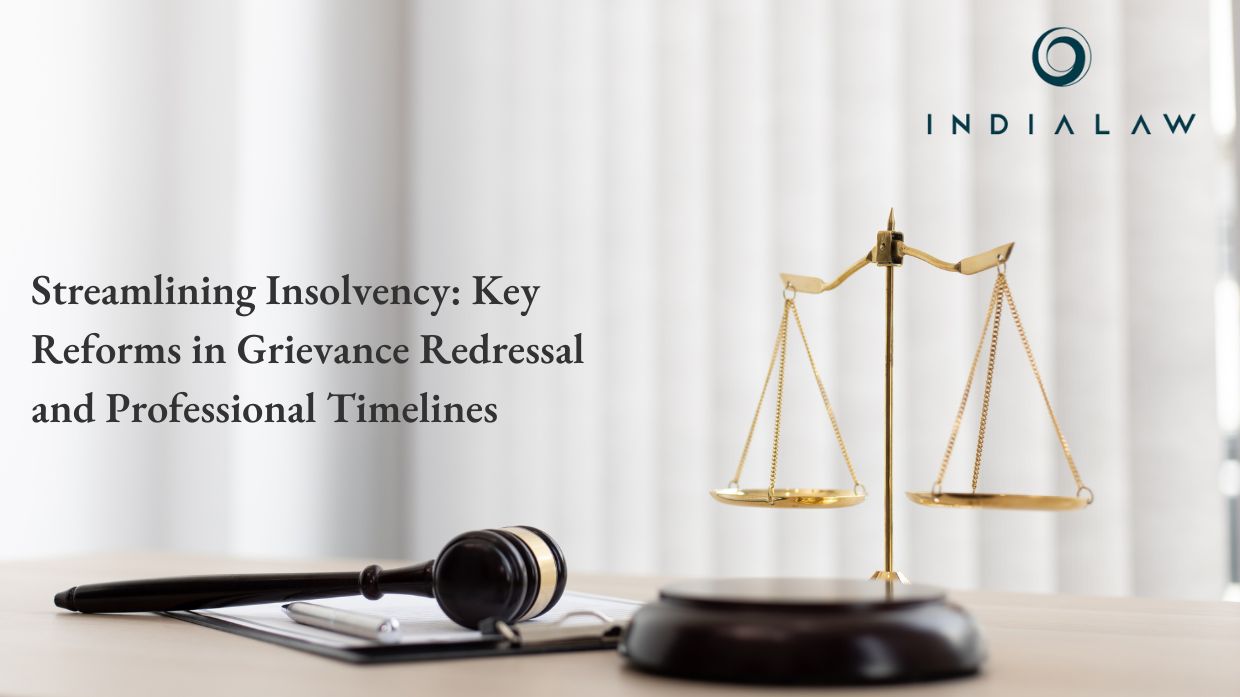Streamlining Insolvency: Key Reforms in Grievance Redressal and Professional Timelines

The Insolvency and Bankruptcy Board of India (IBBI) has proposed key amendments to its grievance redressal and enforcement framework. Through a recent discussion paper dated November 19, 2024, the IBBI outlined changes to strengthen procedural transparency, enhance operational efficiency, and streamline timelines for critical authorizations under the Insolvency and Bankruptcy Code (IBC), 2016. These proposals, open for public comment, aim to address ambiguities in current regulations and improve stakeholder access to justice.
Table of Contents
Key Proposals
1. Ensuring Impartiality in Disciplinary Processes
The IBBI has focused on clarifying the role of whole-time members in the Disciplinary Committee (DC) to avoid potential conflicts of interest.
The Current Framework: Whole-time members of the DC must not be involved in investigations or inspections of cases they adjudicate. However, the absence of a clear definition of “association” creates ambiguity.
The Proposed Amendment: Define “associated” to explicitly include participation in investigations, inspections, reviewing reports, or issuing show-cause notices.
This clarification, to be added to the IBBI (Inspection and Investigation) Regulations, 2017, reinforces the principles of fairness, impartiality, and procedural independence.
2. Extending Timelines for Grievance Filing
Filing grievances or complaints under the IBC is essential for accountability, but the current timeframe has proven restrictive for many stakeholders.
The Current Framework: Grievances must be filed within 45 days of the cause of action, with an extension of 30 days in specific circumstances. This timeline often excludes stakeholders like operational creditors, employees, or other parties with limited resources or knowledge.
The Proposed Amendment: Extend the filing period to 30 days after the conclusion of the insolvency or liquidation process, as finalized by an adjudicating authority or court.
This ensures broader access to the grievance mechanism while preserving the stability of resolved cases.
3. Streamlining Authorisation for Assignment (AFA) Timelines
The AFA is a mandatory license for insolvency professionals (IPs) to undertake assignments. The IBBI proposes to ease the procedural bottlenecks in its issuance and renewal.
The Current Framework:
Applications for AFA renewal can only be made 45 days before expiry.
Insolvency Professional Agencies (IPAs) must process applications within 15 days, leading to “deemed approvals” if the deadline is not met.
The Proposed Amendment:
Extend the renewal application window from 45 to 90 days before expiry.
Allow IPAs 45 days to process applications.
These changes provide flexibility to IPs, ensuring continuity in assignments, and allow IPAs sufficient time for due diligence.
Why These Amendments Matter
These changes are designed to:
1. Strengthen fairness and impartiality in disciplinary processes, ensuring integrity in adjudication.
2. Empower stakeholders, especially those with limited resources, to raise valid grievances without tight time constraints.
3. Enhance the operational efficiency of IPAs, preventing rushed decisions and ensuring proper scrutiny of AFA applications.
These proposals also reflect the IBBI’s commitment to balancing regulatory oversight with stakeholder accessibility and operational feasibility.
Call for Public Participation
The IBBI invites public comments on these proposals until December 10, 2024. Stakeholders, including insolvency professionals, creditors, debtors, and academics, can submit their feedback through the IBBI website. The insights gathered will help shape the final amendments to the IBC framework.
The proposed amendments by the IBBI aim to create a more equitable and efficient insolvency ecosystem. By clarifying disciplinary roles, extending grievance filing timelines, and streamlining the renewal process for professional authorizations, these reforms reflect a deep commitment to fairness, operational excellence, and stakeholder empowerment. These changes will enhance accountability while ensuring that the insolvency resolution framework remains robust and responsive to evolving needs. With public feedback playing a vital role in shaping these regulations, the IBBI has set the stage for a collaborative effort to elevate India’s insolvency processes to global standards.
For further details write to contact@indialaw.in
By entering the email address you agree to our Privacy Policy.



